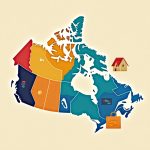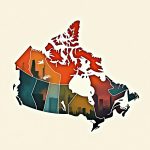Toronto, the city where the CN Tower pierces the sky and the streets hum with the energy of over six million dreams, is a place of endless possibilities. But dreams come with a price tag, and for many, the question looms large: Is $70,000 a good salary in Toronto? This isn’t just a question about numbers—it’s about survival, ambition, and the pursuit of happiness in one of Canada’s most expensive cities. Renowned economist Thomas Piketty once argued that income inequality shapes the fabric of society, and in Toronto, that fabric is woven with threads of soaring rents and rising costs. Meanwhile, personal finance guru Dave Ramsey emphasizes the importance of budgeting, while tech visionary Elon Musk reminds us that innovation can transform even the most daunting challenges. So, can $70,000 stretch far enough in this urban jungle? Let’s find out.
Understanding Toronto’s Cost of Living
Living in Toronto is like being in a high-stakes game of Monopoly—except the properties are real, and the stakes are your paycheck. The city’s cost of living is a hot topic, and for good reason. Let’s break it down.
Housing Costs: The Biggest Expense
If you’ve ever tried to find an apartment in Toronto, you know it’s not for the faint of heart. The average rent for a one-bedroom apartment hovers around $2,500 per month, according to Zumper. That’s a hefty chunk of a $70,000 salary. Buying a home? Even more daunting, with the average home price in Toronto exceeding $1 million. But don’t despair—neighborhoods like Scarborough and Etobicoke offer more affordable options. Renting vs. buying is a personal choice, but one thing’s clear: housing will be your biggest expense.
Daily Expenses: Food, Transportation, and Utilities
Once you’ve secured a roof over your head, the next challenge is keeping the lights on—literally. Monthly utility bills for a small apartment can range from $100 to $150. Groceries? Expect to spend around $300 to $400 per month, depending on your eating habits. Transportation is another key factor. While owning a car in Toronto can cost upwards of $800 per month (including insurance, gas, and parking), the TTC offers a more budget-friendly alternative at $156 for a monthly pass. The choice is yours, but your wallet will thank you for choosing wisely.
Lifestyle and Entertainment
Toronto is a city that never sleeps, and neither does your spending if you’re not careful. A night out at a mid-range restaurant can set you back $50 to $100, while a gym membership might cost $50 to $100 per month. Add in the occasional concert, movie, or sporting event, and your entertainment budget can quickly spiral. But here’s the thing: your lifestyle choices have a direct impact on your financial health. Want to save more? Cut back on dining out and explore free activities like hiking in High Park or visiting the Art Gallery of Ontario on free admission days. It’s all about balance.
Breaking Down a $70,000 Salary
So, you’ve landed a $70,000 job in Toronto—congrats! But before you start planning that luxury vacation or buying that shiny new gadget, let’s crunch the numbers and see what this salary really means after taxes and expenses.
After-Tax Income: What You Actually Take Home
First things first: the Canadian government isn’t just going to let you keep all $70,000. Between federal and provincial taxes, your take-home pay will be significantly less. In Ontario, a $70,000 salary will leave you with about $52,000 after taxes. That’s roughly $4,333 per month. Not bad, but it’s definitely not Monopoly money.
Budgeting on $70,000
Now, let’s talk budgeting. The 50/30/20 rule is a great starting point. Here’s how it breaks down:
- 50% for needs: Rent, utilities, groceries, and transportation. For Toronto, this might feel like a challenge, but it’s doable if you’re strategic.
- 30% for wants: Dining out, gym memberships, and that Netflix subscription you can’t live without.
- 20% for savings: Building an emergency fund, investing, or saving for a down payment on a home.
Here’s a sample monthly budget for a single person:
- Rent: $2,000 (for a decent one-bedroom apartment)
- Groceries: $300
- Transportation: $150 (for a monthly TTC pass)
- Utilities: $100
- Dining out/Entertainment: $300
- Savings: $866
It’s tight, but with a little discipline, you can make it work. Just don’t expect to be dining at CN Tower’s revolving restaurant every weekend.
Savings and Investments
Speaking of savings, let’s get real about how much you can stash away on $70,000. If you follow the 20% rule, you’re looking at saving $14,000 annually. That’s a solid start, but to really build wealth, you’ll need to think about investing. Consider opening a Tax-Free Savings Account (TFSA) or contributing to a Registered Retirement Savings Plan (RRSP). And if the stock market feels like a foreign language, robo-advisors like Wealthsimple can do the heavy lifting for you.
Comparing $70,000 to Toronto’s Average Income
Let’s put $70,000 into perspective. Is it above or below the average in Toronto? Spoiler alert: it’s somewhere in the middle.
Median Household Income in Toronto
The median household income in Toronto is around $85,000, according to Statistics Canada. That means $70,000 is slightly below the average, but it’s still a respectable income, especially if you’re single and don’t have dependents. However, if you’re supporting a family, things get trickier.
Cost of Living vs. Income Growth
Here’s the kicker: Toronto’s cost of living has been rising faster than incomes. While wages have increased by about 2% annually, housing costs have skyrocketed by nearly 10%. It’s like running on a treadmill that’s speeding up—you’re moving, but not getting very far. This disconnect means $70,000 doesn’t stretch as far as it used to, especially if you’re dreaming of homeownership.
Is $70,000 Enough for a Family?
Let’s say you’re a family of four. Suddenly, $70,000 feels like a tightrope walk. Here’s a quick breakdown of potential monthly expenses:
- Rent: $2,500 (for a two-bedroom apartment)
- Groceries: $700
- Childcare: $1,500 (yes, it’s brutal)
- Transportation: $300
- Utilities: $150
That’s $5,150 in just basic expenses, leaving you with very little wiggle room. Add in occasional splurges like a family outing to Ripley’s Aquarium or school fees, and it’s easy to see why many families feel the pinch. To make it work, you’ll need to prioritize, budget meticulously, and maybe even consider a side hustle.
Strategies to Maximize a $70,000 Salary
Living in Toronto on $70,000 a year isn’t just about survival—it’s about making smart choices to stretch every dollar. Whether you’re trying to save for a down payment, pay off student loans, or just enjoy the city without constant financial stress, these strategies can help you get the most out of your income.
Reducing Housing Costs
Housing eats up the biggest chunk of your paycheck in Toronto. But there are ways to cut costs without living in a shoebox:
- Consider roommates or co-living spaces: Splitting rent can save you hundreds each month. Websites like Kijiji or Bunz Home Zone list shared housing options.
- Look beyond downtown: Neighborhoods like Scarborough, Etobicoke, or East York offer lower rents while still being transit-accessible. Check Zumper for up-to-date rental listings.
- Negotiate your rent: Landlords might lower the price if you sign a longer lease or pay a few months upfront.
Cutting Daily Expenses
Small changes add up fast. Here’s how to trim your spending without feeling deprived:
- Meal prep like a pro: Toronto grocery stores like No Frills or FreshCo offer budget-friendly options. Avoid eating out—just three $15 lunches a week adds up to $180/month!
- Ditch the car: With a TTC pass ($156/month) and occasional ride-shares, you’ll save thousands compared to car ownership (insurance, gas, and parking can cost $800+/month).
- Use cashback apps: Apps like Rakuten or Flipp help you save on everyday purchases.
Increasing Your Income
Sometimes, cutting costs isn’t enough. Here’s how to boost your earnings:
- Freelance or side hustle: Platforms like Upwork or Fiverr let you monetize skills like writing, graphic design, or coding.
- Rent out your space: If you have a parking spot or spare room, list it on Airbnb or Parkopedia.
- Upskill for promotions: Free courses from Coursera or LinkedIn Learning can qualify you for higher-paying roles.
Long-Term Financial Planning on $70,000
Making $70,000 work in Toronto isn’t just about today—it’s about securing your future. Whether you dream of homeownership, early retirement, or just financial peace of mind, these steps will help you build wealth over time.
Retirement Savings
Even on a modest salary, saving for retirement is doable. Here’s how:
- Start with an RRSP: Contribute enough to get your employer’s match (if offered)—it’s free money! Use the Wealthsimple robo-advisor for low-fee investing.
- Open a TFSA: Ideal for tax-free growth. Even $200/month at a 6% return grows to ~$100,000 in 20 years.
- Take advantage of government programs: The CPP and OAS provide a safety net, but don’t rely solely on them.
Debt Management
Debt can crush your financial goals. Tackle it strategically:
- Prioritize high-interest debt: Credit cards (19-24% interest) should be paid off ASAP. Consider a balance transfer to a lower-rate card like MBNA.
- Refinance student loans: Organizations like CreditAid can help negotiate better terms.
- Avoid lifestyle inflation: Every raise or bonus should go toward debt before splurging.
Building Wealth
Growing your net worth requires patience and smart choices:
- Invest in low-cost index funds: Vanguard ETFs are a great start. Even $500/month can build substantial wealth over decades.
- Consider real estate (carefully): While Toronto’s market is pricey, REITs or smaller nearby cities (Hamilton, Oshawa) offer alternatives.
- Diversify income streams: Dividend stocks, side businesses, or rental income can supplement your salary.
AI Solutions: How Could AI Help?
Artificial Intelligence (AI) is no longer a futuristic concept—it’s here, and it’s reshaping how we manage our lives, especially in cities like Toronto. From budgeting to career development, AI offers tools and solutions that can make living on a $70,000 salary not just manageable but thriving. Let’s explore how AI can revolutionize your finances and help you navigate Toronto’s high-cost landscape.
Personalized Budgeting Tools
Budgeting apps like Mint and YNAB leverage AI to analyze your spending habits and provide tailored recommendations. These apps categorize your expenses, identify unnecessary spending, and suggest ways to save. For example, if you’re spending too much on dining out, the app might recommend meal prepping or finding cheaper alternatives. AI can even predict future expenses based on your past behavior, helping you stay ahead of your budget.
Automated Savings and Investments
Robo-advisors like Wealthsimple and Betterment use AI to create low-cost, personalized investment portfolios. These platforms analyze your risk tolerance, financial goals, and timeline to recommend the best investment strategies. They also automate savings, allocating a portion of your income to investments or emergency funds. This hands-off approach ensures you’re consistently building wealth without the stress of micromanaging your finances.
Predictive Analytics for Financial Planning
AI tools like PocketGuard use predictive analytics to forecast future expenses and income. By analyzing trends in your spending and earning patterns, these tools can help you anticipate financial challenges and plan accordingly. For instance, if a large expense is coming up, AI can advise you to cut back on discretionary spending or save more in the months leading up to it. This proactive approach minimizes financial stress and ensures you’re always prepared.
AI in Housing and Real Estate
Finding affordable housing in Toronto can be a challenge, but AI-powered platforms like Zillow and REW simplify the process. These platforms use algorithms to match you with housing options that fit your budget and preferences. AI can also analyze real estate market trends, helping you decide whether to rent or buy. For those interested in investing, predictive models can identify neighborhoods with high growth potential, maximizing your returns on real estate investments.
AI-Powered Career Development
AI isn’t just for budgeting—it can also boost your earning potential. Platforms like LinkedIn and Coursera use AI to recommend high-paying job opportunities and upskilling programs. LinkedIn’s AI analyzes your skills and experience to suggest jobs that match your profile, while Coursera’s algorithms recommend courses that can help you advance in your career. By leveraging these tools, you can increase your income and open doors to new opportunities.
Action Schedule/Roadmap
- Day 1: Assess your current financial situation using AI tools like Mint or YNAB.
- Day 2: Set short-term and long-term financial goals. Use predictive analytics to forecast future expenses and income.
- Week 1: Create a detailed budget with AI-powered apps. Identify areas where you can cut back and automate savings.
- Week 2: Explore affordable housing options using AI platforms like Zillow or REW.
- Month 1: Start an emergency fund and automate investments with a robo-advisor like Wealthsimple.
- Month 2: Begin upskilling with AI-driven platforms like Coursera or LinkedIn Learning. Identify high-paying job opportunities.
- Year 1: Review and adjust your financial plan. Use AI to stress-test your budget and investments.
- Year 1.5: Explore side hustles or freelance opportunities. Use AI tools to manage multiple income streams.
- Year 2: Evaluate progress toward long-term goals. Leverage AI to optimize your financial strategy and maximize income.
Building a Future with AI in Toronto
Living in Toronto on a $70,000 salary is entirely possible with the right tools and strategies. AI isn’t just a buzzword—it’s a game-changer for personal finance, career development, and overall quality of life. By leveraging AI-powered tools, you can take control of your finances, reduce stress, and achieve your goals. Whether it’s finding affordable housing, automating savings, or upskilling for a higher-paying job, AI offers solutions tailored to your needs.
The key is to start small and stay consistent. Use AI to track your spending, set realistic goals, and make informed decisions. Over time, these incremental changes will add up, helping you build wealth and thrive in Toronto’s dynamic economy. The future of personal finance is here, and it’s powered by AI. Are you ready to embrace it?
For more insights into Toronto’s economy and lifestyle, visit Toronto News.
Frequently Asked Questions (FAQ)
Is $70,000 a good salary in Toronto?
Yes, $70,000 can provide a decent lifestyle in Toronto, but it depends on your spending habits, housing choices, and financial goals. While it's above the city's median individual income, rising costs—especially in housing—mean you'll need to budget wisely. For context, check out Statistics Canada’s latest income data.
How much is $70,000 after taxes in Toronto?
After federal and provincial taxes, CPP, and EI deductions, your take-home pay is roughly $52,000–$54,000 annually (about $4,300–$4,500/month). Use the Wealthsimple Tax Calculator for a precise estimate.
Can I afford to rent alone on $70,000?
Yes, but expect to spend 35–50% of your income on rent. The average 1-bedroom apartment costs $2,500/month downtown, but cheaper options exist in neighborhoods like Scarborough or Etobicoke (closer to $1,800).
What neighborhoods are affordable on this salary?
- East York: Family-friendly, avg. rent $1,900.
- North York: Near transit, avg. rent $2,100.
- Jane and Finch: Budget-friendly (but research safety).
Explore listings on Realtor.ca or Kijiji.
How much should I save each month?
Follow the 50/30/20 rule:
| 50% | Needs (rent, groceries, bills) |
| 30% | Wants (dining, hobbies) |
| 20% | Savings/debt ($1,000+/month) |
Use apps like Mint to track spending.
Is buying a home possible on $70K?
It’s tough. A $500,000 condo requires a $100,000 down payment (20%) and a $400,000 mortgage. Your max approval would be ~$350,000, so you’d need savings or a partner. Try CMHC’s affordability calculator.
What AI tools can help manage my budget?
- YNAB: Tracks every dollar.
- Wealthsimple: Invests spare change.
- PocketGuard: Alerts overspending.
How can I earn more in Toronto?
Side hustles like:
- Freelancing (Upwork).
- Renting a spare room (Airbnb).
- Upskilling via Coursera or LinkedIn Learning.
Where can I find Toronto-specific financial advice?
Check Toronto News for local tips, or join the r/PersonalFinanceCanada subreddit.
Wait! There's more...check out our gripping short story that continues the journey: Urban Odyssey
Disclaimer: This article may contain affiliate links. If you click on these links and make a purchase, we may receive a commission at no additional cost to you. Our recommendations and reviews are always independent and objective, aiming to provide you with the best information and resources.
Get Exclusive Stories, Photos, Art & Offers - Subscribe Today!





























Post Comment
You must be logged in to post a comment.